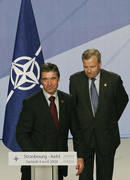 Danish PM Anders Fogh Rasmussen’s bid to succeed Dutchman Jaap de Hoop Scheffer as head of NATO finally succeeded at yesterday’s summit. Up until the last minute, the Turks were refusing to sanction his appointment because of his refusal to apologise for a Danish newspaper publishing those Muhammad cartoons.
Danish PM Anders Fogh Rasmussen’s bid to succeed Dutchman Jaap de Hoop Scheffer as head of NATO finally succeeded at yesterday’s summit. Up until the last minute, the Turks were refusing to sanction his appointment because of his refusal to apologise for a Danish newspaper publishing those Muhammad cartoons.
The Danish press is full of stories about the concession that had to be given before Ankara lifted its veto. These range from having a Turkish Deputy NATO Secretary-General (the post is currently held by an Italian) to the closure of a Kurdish TV station that broadcasts from Denmark to an extension of the deadline for easing travel by Greek Cypriots into Turkey. The Turkish newspaper Hurriyet is even claiming that Fogh Rasmussen will now publicly apologise for the publication of the cartoons depicting Muhammad by a Danish newspaper. How true any of this is remains unclear (the last one seems very unlikely).
Either way, the NATO alliance has a new, tough-minded boss who has a reputation in Denmark for being principled, extremely hard-working and organized. Though he rose to the top job in Danish politics without a stint in the Foreign Ministry, he has since garnered considerable international experience, not least from his time as head of the EU’s rotating Presidency, when he oversaw the EU’s enlargement to include a slew of Eastern European countries. Danish support for both the Iraq War and NATO’s Afghan mission –- in which Danish soldiers are fighting alongside Brits in Helmand — garnered Fogh Rasmussen support in both Washington and London.
The Danish leader will have his work cut out for him, though, as the Alliance faces considerable challenges: it Afghan mission is troubled and its members are split about expanding its membership eastwards into Russia’s near abroad. But the 60-year old alliance faces an even more fundamental question: what is its purpose in the 21st century? In Anders Fogh Rasmussen, NATO has a leader who is well-qualified to help answer this question in both a principled and pragmatic manner.
Daniel Korski
NATO’s new man at the helm






Comments